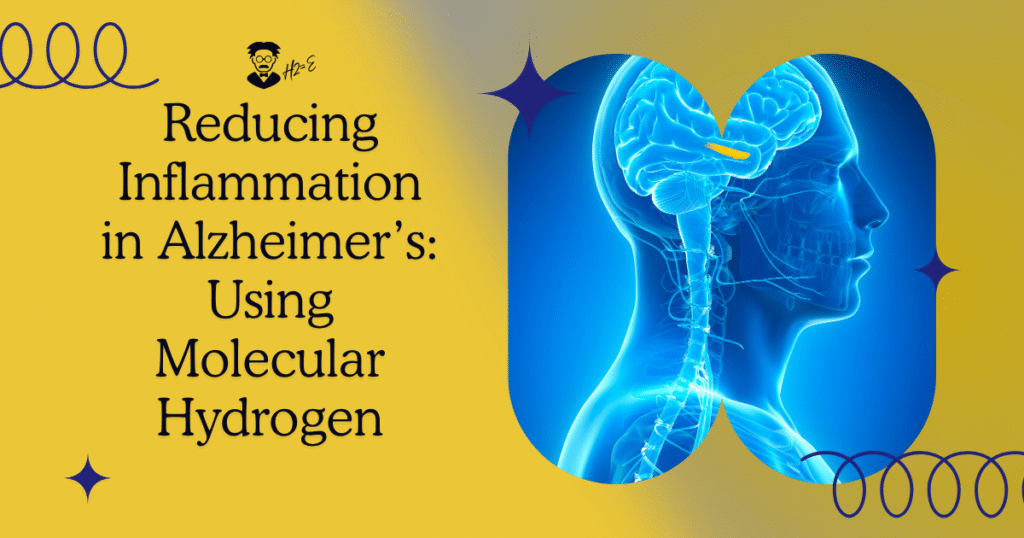Alzheimer’s disease (AD) is a devastating neurodegenerative disorder characterized by cognitive decline and memory loss. While the exact causes of AD are complex and not fully understood, chronic inflammation in the brain is recognized as a significant contributing factor. Emerging research suggests that molecular hydrogen therapy may offer a promising avenue for reducing this inflammation and potentially slowing the progression of AD. This blog post will explore the science behind molecular hydrogen, its anti-inflammatory effects, and its potential benefits for individuals affected by Alzheimer’s.
What is Molecular Hydrogen Therapy?
Molecular hydrogen (H₂) is the simplest and smallest molecule in the universe. It’s a colorless, odorless, and tasteless gas that, when dissolved in water or inhaled, can exert therapeutic effects in the body. Molecular hydrogen therapy involves administering H₂ through various methods, including:
- Drinking hydrogen-rich water: Water infused with dissolved hydrogen gas.
- Inhalation of hydrogen gas: Breathing in H₂ gas.
The Science Behind Molecular Hydrogen’s Anti-Inflammatory Effects
The therapeutic potential of molecular hydrogen stems from its unique properties:
- Selective Antioxidant: H₂ acts as a selective antioxidant, neutralizing only the most harmful free radicals, such as hydroxyl radicals (•OH), without disrupting essential reactive oxygen species (ROS) needed for cellular signaling.
- Reduces Oxidative Stress: By targeting these harmful free radicals, H₂ reduces overall oxidative stress, a key contributor to inflammation and cellular damage in AD.
- Modulates Inflammatory Pathways: H₂ has been shown to modulate various inflammatory pathways, such as the NF-κB pathway, which plays a central role in regulating the expression of pro-inflammatory cytokines.
- Promotes Mitochondrial Function: H₂ can improve mitochondrial function, the powerhouse of the cell. Damaged mitochondria contribute to oxidative stress and inflammation, so enhancing their function is crucial.
Molecular Hydrogen and Alzheimer’s Disease: Targeting Inflammation
In Alzheimer’s disease, chronic neuroinflammation is driven by factors such as amyloid-beta plaques and tau tangles. This inflammation exacerbates neuronal damage and contributes to cognitive decline. Molecular hydrogen’s anti-inflammatory properties offer a potential strategy to mitigate these effects:
- Reduces Microglial Activation: Microglia, the brain’s immune cells, become overactive in AD, releasing inflammatory molecules. H₂ can help regulate microglial activation, reducing the release of these harmful substances.
- Protects Neurons: By reducing oxidative stress and inflammation, H₂ can protect neurons from damage and promote their survival.
- Improves Cognitive Function: Some studies suggest that H₂ may improve cognitive function in animal models of AD by reducing inflammation and oxidative stress.
Important Note: While promising, most research is currently in preclinical stages (animal studies and cell cultures). More human clinical trials are needed to confirm these findings and determine the optimal dosage and delivery methods.
Key Inflammatory Players in AD:
- Amyloid-beta plaques
- Tau tangles
- Activated microglia
- Pro-inflammatory cytokines
- Oxidative stress
How Molecular Hydrogen Helps:
- Reduces oxidative stress by neutralizing harmful free radicals.
- Modulates inflammatory pathways, dampening down the production of inflammatory cytokines.
- Protects neurons from damage caused by inflammation.
- May improve cognitive function by reducing inflammation and improving neuronal health.
What Else can Possibly Help
The other suggestions that could possibly help, are going on a low carb diet, avoiding seed oils, alcohol and processed foods. Possibly the following health supplements may help.
- Omega 3, 6 and 9
- Ginko Biloba
- Glutathione and SOD
- Lions Mane
Potential Benefits and Future Directions
The potential benefits of molecular hydrogen therapy for Alzheimer’s patients include:
- Reduced inflammation in the brain: Potentially slowing disease progression.
- Improved cognitive function: Although more research is needed to confirm this.
- Neuroprotection: Protecting brain cells from damage.
- Relatively safe and well-tolerated: With minimal known side effects.
Future research is looking at on conducting larger, randomized, controlled clinical trials to assess the efficacy of H₂ in AD patients. These trials will investigate different delivery methods, dosages, and treatment durations to optimize therapeutic outcomes. Further exploration of the mechanisms by which H₂ exerts its effects in the brain is also warranted.
In conclusion, molecular hydrogen therapy represents a promising, novel approach to reduce inflammation and potentially slow the progression of Alzheimer’s disease. Its selective antioxidant and anti-inflammatory properties offer a unique strategy for mitigating the harmful effects of neuroinflammation. While further research is needed, the current evidence suggests that molecular hydrogen may hold significant benefits for individuals affected by this debilitating condition. Always consult with a healthcare professional before starting any new therapy, including molecular hydrogen.


